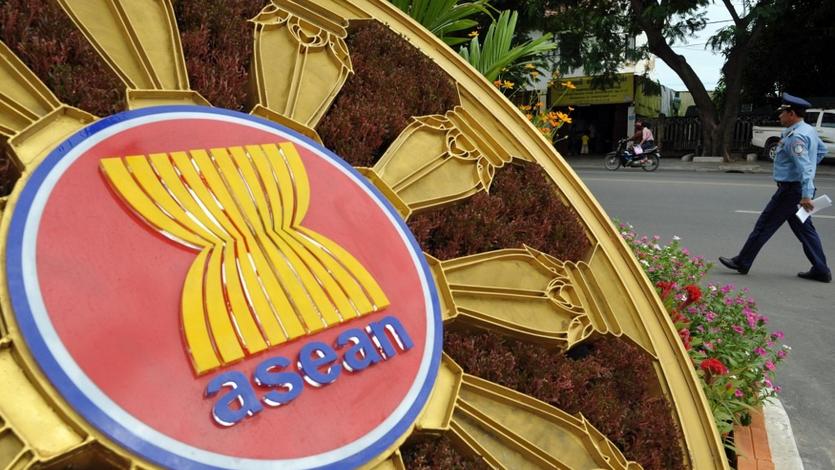 In this July 8, 2012 file photo, a Cambodian police officer (R) walks past the ASEAN logo in front of the Peace Palace during the 45th Association of Southeast Asian Nations (ASEAN) Foreign Ministers' Meeting (AMM) in Phnom Penh. (TANG CHHIN SOTHY/AFP)
In this July 8, 2012 file photo, a Cambodian police officer (R) walks past the ASEAN logo in front of the Peace Palace during the 45th Association of Southeast Asian Nations (ASEAN) Foreign Ministers' Meeting (AMM) in Phnom Penh. (TANG CHHIN SOTHY/AFP)
China will establish a China-Association of Southeast Asian Nations poverty reduction expert base in the hope that these countries’ governments, research institutions and international organizations can bring together more new concepts and ideas, said Liu Huanxin, head of the National Rural Revitalization Administration.
In 2007, China and ASEAN initiated the ASEAN-China Forum on Social Development and Poverty Reduction to exchange new practices in poverty reduction and share new ways to promote rural development
He made the remarks at the 16th ASEAN-China Forum on Social Development and Poverty Reduction held in Nanning, Guangxi Zhuang autonomous region, on Tuesday.
ALSO READ: ASEAN defense ministers vow to boost bloc's centrality, unity
He said that through the base, he hoped that more education and training resources can flow to the grassroots to improve the ability of rural officials and workers to lift more people out of poverty.
“China and ASEAN countries are geographically close, culturally connected and share a common destiny. The two have learned from each other’s experiences of poverty alleviation for years,” he said.
In 2007, the two sides initiated the forum to exchange new practices in poverty reduction and share new ways to promote rural development.
Liu shared some of China’s practices at the forum.
ALSO READ: China, Malaysia to safeguard ASEAN-centered cooperation
“In China, we have been increasing investment in talent cultivation and technology to develop specialty industries in areas that were recently lifted out of poverty.
“We take an industrial boom as the premise for solving all problems in rural areas,” he said.
So far, more than 2,600 experts have been sent to 160 key counties in China that needed support for rural vitalization to provide scientific and technological services and personnel training assistance, Liu said.
Tens of thousands of officials and workers were also dispatched to villages in the country to boost local industrial development, he said.
U Hla Moe, Myanmar’s minister for cooperatives and rural development, said at the forum that about one-third of Myanmar’s rural population is trapped in poverty.
ALSO READ: China, ASEAN to grasp opportunities
To reduce the wealth gap between rural and urban areas, the ministry is enhancing cooperatives in agriculture and livestock-based production … and the development of small and medium-sized cottage industries, he said.
“We sincerely appreciate the Chinese government for the contribution of not only financial and technical assistance, but also knowledge and experience sharing on poverty reduction,” he said.
He said thanks to China’s financial support, Myanmar implemented the Pilot Project of Poverty Reduction Cooperation last year. Currently, under the Mekong-Lancang Cooperation Special Fund, they are implementing Phase II of the project as well as a rural water supply project, rural electrification project and innovative village development project.
Abdul Kahar, undersecretary of strategic planning for Malaysia’s ministry of rural development, shared how skills training helps the country reduce poverty. “Education on skills is imperative to poverty reduction,” he said.
“Short courses are given to targeted groups to change their mindset to be less dependent on government assistance or subsidies through self-improvement and character building,” he added.
The ministry also addressed the issue of educational dropoutsby providing them with technical upskilling for their future sustainability in the digital age, he said.
Contact the writers at lihongyang@chinadaily.com.cn


